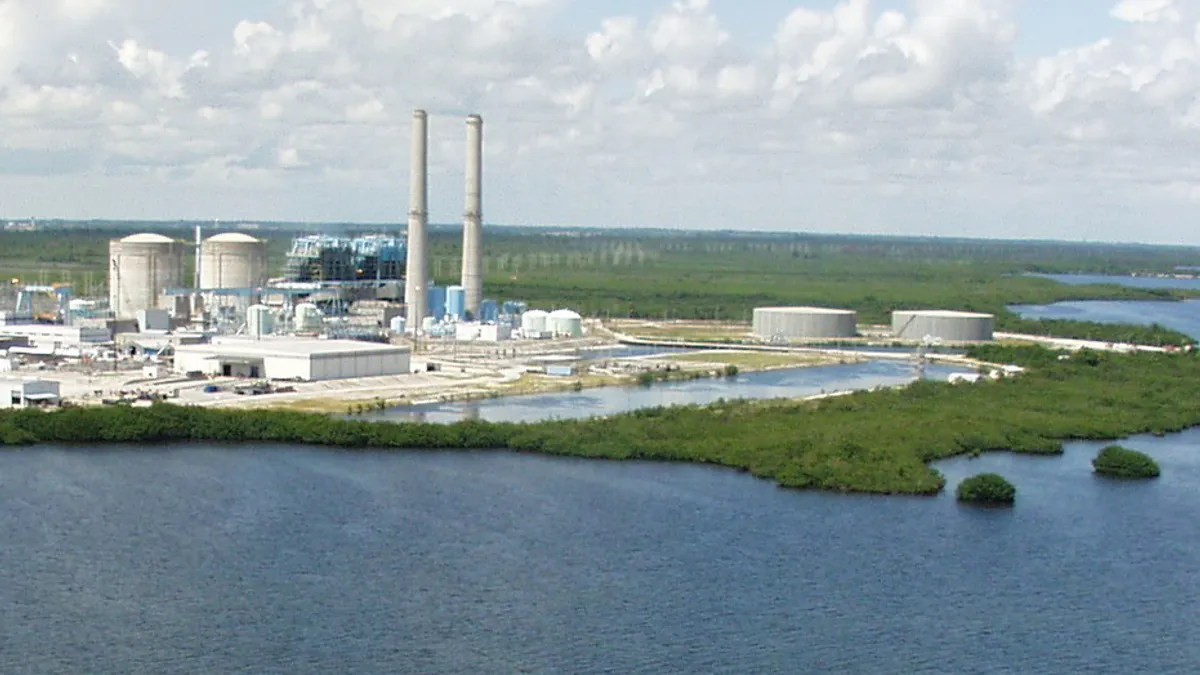Dive Brief:
- Scrutiny is growing around Florida Power & Light's proposal to construct two new nuclear units at the utility's existing Turkey Point plant, with two state Senate committees holding a hearing last week to discuss how the existing plant is impacting the environment.
- Turkey Point cooling canals were leaking a salt plume into Biscayne Bay, and Politico reports the radioactive isotope tritium was also found in the Bay.
- FPL, last month, said it had taken actions to reduce salinity levels in the canals and had determined that it will no longer need to access water from the South Florida Water Management District's L-31 canal.
Dive Insight:
FPL is working to clean up the Turkey Point nuclear facility, located about 25 miles from Miami, and last month issued a statement announcing "progress on several fronts" in the utility's effort to improve the water quality in and around the plant's cooling canal system.
"FPL's actions to reduce salinity levels in the canals combined with recent rainfall have improved the system's water quality to the point at which the company has determined that it will no longer need to access water from the South Florida Water Management District's L-31 canal in the foreseeable future," the utility said.
But is it too little, too late?
Last month, the 3rd District Court of Appeal in Miami reversed the state's decision to allow the reactors. And The Florida Senate Committee on Communications, Energy and Public Utilities and the Senate Committee on Environmental Preservation and Conservation held a joint workshop last week to examine environmental issues related to the plant.
“The Turkey Point nuclear power plant has been having an ongoing issue with the cooling canals that flow from the power plant, which are impacting Biscayne Bay,” said Sen. Anitere Flores (R), representing Miami. “Changes occurring in Biscayne Bay and the Biscayne Aquifer suggest that legislative scrutiny of the cooling pools and their impact on the water supply of those in Miami-Dade County and the Florida Keys is warranted."
"This is not only an important health issue for these Floridians, but also important in insuring the protection of our precious aquifer and overall ecosystem," Flores said.
At the workshop, presentations were made by the Florida Department of Environmental Protection, the Department of Regulatory and Economic Resources of Miami-Dade County, the U.S. Nuclear Regulatory Commission and Florida Power and Light.
While a federal operating permit is still pending, opponents say the site is a poor choice. Hearings in 2014, when the state approved the site for additional reactors, largely focused on the need for additional transmission.
"I think one would be hard-pressed to find a worse place to put a nuclear power plant — let alone expand one," Caroline McLaughlin, Biscayne program manager for the National Parks Conservation Association, told Politico.
That sentiment was echoed by Sara Barczak of the Southern Alliance for Clean Energy, who told the news outlet: "It wasn't a good site way back in the early 1970s, and it hasn't become a better site."















